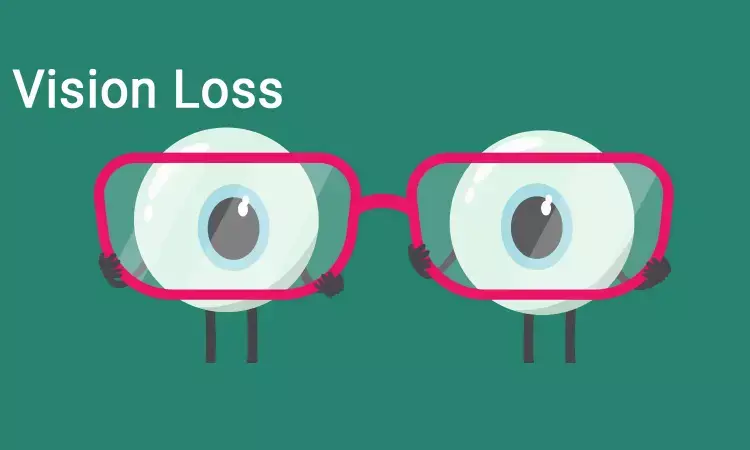- Home
- Medical news & Guidelines
- Anesthesiology
- Cardiology and CTVS
- Critical Care
- Dentistry
- Dermatology
- Diabetes and Endocrinology
- ENT
- Gastroenterology
- Medicine
- Nephrology
- Neurology
- Obstretics-Gynaecology
- Oncology
- Ophthalmology
- Orthopaedics
- Pediatrics-Neonatology
- Psychiatry
- Pulmonology
- Radiology
- Surgery
- Urology
- Laboratory Medicine
- Diet
- Nursing
- Paramedical
- Physiotherapy
- Health news
- Fact Check
- Bone Health Fact Check
- Brain Health Fact Check
- Cancer Related Fact Check
- Child Care Fact Check
- Dental and oral health fact check
- Diabetes and metabolic health fact check
- Diet and Nutrition Fact Check
- Eye and ENT Care Fact Check
- Fitness fact check
- Gut health fact check
- Heart health fact check
- Kidney health fact check
- Medical education fact check
- Men's health fact check
- Respiratory fact check
- Skin and hair care fact check
- Vaccine and Immunization fact check
- Women's health fact check
- AYUSH
- State News
- Andaman and Nicobar Islands
- Andhra Pradesh
- Arunachal Pradesh
- Assam
- Bihar
- Chandigarh
- Chattisgarh
- Dadra and Nagar Haveli
- Daman and Diu
- Delhi
- Goa
- Gujarat
- Haryana
- Himachal Pradesh
- Jammu & Kashmir
- Jharkhand
- Karnataka
- Kerala
- Ladakh
- Lakshadweep
- Madhya Pradesh
- Maharashtra
- Manipur
- Meghalaya
- Mizoram
- Nagaland
- Odisha
- Puducherry
- Punjab
- Rajasthan
- Sikkim
- Tamil Nadu
- Telangana
- Tripura
- Uttar Pradesh
- Uttrakhand
- West Bengal
- Medical Education
- Industry
Visual processing slower in children with dyslexia compared to their typically developing peers

The study, published in JNeurosci and the first to combine new methods to understand visual processing and brain activity in dyslexia, challenged a group of children aged six to 14 to identify the average direction of motion of a mass of moving dots, while their brain activity was measured.
It found children with dyslexia took longer to gather the visual evidence, and were less accurate, than their typically developing peers, and that the behavioural differences were reflected in differences in brain activity.
Although reading ability is known to be affected by dyslexia, researchers are still unclear on which brain processes are affected by the condition. Increasing understanding of this could potentially lead to more effective support for those affected.
Dr Cathy Manning, lead researcher in the Centre for Autism at the University of Reading, said: "These findings show that the difficulties faced by children with dyslexia are not restricted to reading and writing. Instead, as a group, children with dyslexia also show differences in how they process visual information and make decisions about it.
"Future research will be needed to see if these differences in visual processing and decision-making can be trained in order to improve reading ability in affected children, or provide clues as to the causes of dyslexia."
Brain activity monitoring using EEG in the study showed synchronized activity over the centro-parietal regions of the brain involved in decision-making steadily increased in all of the children during the task until they made a decision. However, this happened more gradually in the children with dyslexia.
The study supports a link between motion processing and dyslexia, although the causes are not yet known.
Whether dyslexia is, at its core, a visual processing disorder is hotly debated among researchers. With reading and writing a key challenge among children with dyslexia, increasing understanding of its effects on the brain might aid how we improve existing interventions.
Story Source:Catherine Manning, Cameron D. Hassall, Laurence T. Hunt, Anthony M. Norcia, Eric-Jan Wagenmakers, Margaret J. Snowling, Gaia Scerif, Nathan J. Evans. Visual motion and decision-making in dyslexia: Reduced accumulation of sensory evidence and related neural dynamics. The Journal of Neuroscience, 2021; JN-RM-1232-21 DOI: 10.1523/JNEUROSCI.1232-21.2021
Hina Zahid Joined Medical Dialogue in 2017 with a passion to work as a Reporter. She coordinates with various national and international journals and association and covers all the stories related to Medical guidelines, Medical Journals, rare medical surgeries as well as all the updates in the medical field. Email: editorial@medicaldialogues.in. Contact no. 011-43720751
Dr Kamal Kant Kohli-MBBS, DTCD- a chest specialist with more than 30 years of practice and a flair for writing clinical articles, Dr Kamal Kant Kohli joined Medical Dialogues as a Chief Editor of Medical News. Besides writing articles, as an editor, he proofreads and verifies all the medical content published on Medical Dialogues including those coming from journals, studies,medical conferences,guidelines etc. Email: drkohli@medicaldialogues.in. Contact no. 011-43720751


